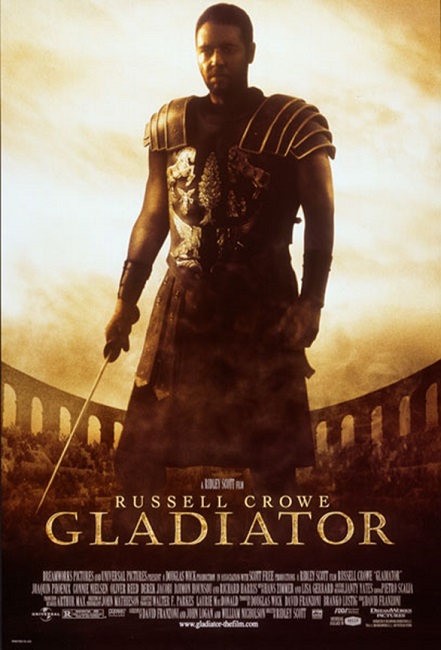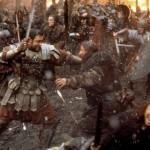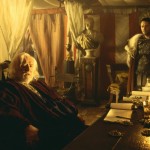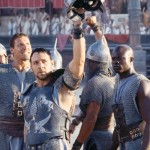
Gladiator – 2000
I will start off by saying that this is a highly enjoyable movie, but it has generally been my opinion that it should not have won the award for Best Picture. Now, there are several specific reasons why I think that. First of all, the dialogue was very poorly written. It was, at times, unnatural and forced, at other times too verbose and awkward. The actors did the best they could with what they were given, but it is often hard to polish dialogue that is poorly written.
Another thing about the film that I found lacking was the character development. Only one of the main characters had any depth, and even that was only for a short time. Most of the characters were very one dimensional. They started one way and remained that way, without any changes, until the end of the movie – All except for the character of Lucilla. But I’ll get to that in a bit.
Thirdly, it was up against some pretty good films like Traffic, Erin Brockovich, Chocolat and Crouching Tiger Hidden Dragon. Well, OK that makes me pause. The only one of those I would consider competition for Gladiator is Erin Brockovich. Traffic was simply too unmemorable. Chocolat was too confusing and had too little emotional punch. Crouching Tiger Hidden Dragon was a good movie but was too gimmicky – like a fad. Erin Brockovich was good but even so, the it only succeeded because of Julia Roberts. Without her it would have been just an average movie.
So… Why not Gladiator? Gladiator certainly had a large and epic feel that transported audiences to an exotic and mysterious time in history that is known for its world changing people and events; a time of emperors, slaves and peasants. It is known for its cultural excesses and depravities, the extreme cruelty of some of its leaders, and yet also the incredible advances in art and science that helped to shape the world we live in today.
Ridley Scott was the director of this piece of historical fiction about a soldier in the Roman legions named Maximus Decimus Meridius. He is a skilled fighter who has achieved the rank of General. He is the kind of man who personally cares for each of the men under his command and has consequently earned unwavering respect and loyalty from his men.
Interesting note: If the name was actually said properly, according to Roman tradition, it would be Decimus Meridius Maximus. In fact there were enough departures from true history that at least one historical advisor who worked on the film resigned due to the changes that Scott made. Another asked not to be mentioned in the credits.
Maximus is played by actor Russell Crowe. I know that as a celebrity, Crowe has built himself a reputation as… to put it bluntly, an asshole. But there is no denying that he is a very good actor. His character was a conglomeration of several historical figures, taking the best qualities of each of them and making one man. The trouble is, this turns the man into a saint. There was nothing human about him. He was good to a fault. He killed only when it was necessary. He was sure of his motives and unwavering in his morals.
Interesting note: The screenplay had to have a lot of rewrites, as Russell Crowe kept questioning every aspect of the script and actually walked off the set when he did not get the answers he wanted. In fact, one of the writers, William Nicholson, said of the overly-melodramatic line, “In this life or the next, I will have my vengeance,” Russell refused to say it. When he finally relented, he did so saying, “Your lines are garbage but I’m the greatest actor in the world, and I can make even garbage sound good.“
Opposite him was Commodus, played by Joaquin Phoenix. He was the bad guy. His every line, every action and every motive was evil. He was selfish, cruel, dishonest, manipulative and vain. He hadn’t a single redeeming quality, not a single virtue. Again, I have to call this poor writing. As the audience, we have no sympathy for him. There was no question that he needed to be defeated in the end and when it happened, we were just glad to be rid of him.
I think the plot, the emotional depth, and the engagement of the audience would have all been better served by making the two lead characters a little more human. Maybe they could have made Maximus a little darker or unsympathetic. Maybe they could have made him a man who enjoyed the all the violence and killing a bit too much. Maybe they could have made Commodus a little more sympathetic. Maybe they could have given him motives that were close to understandable or a past that made him seem misunderstood. Things like that would have made for deeper characters. It would have made for greater emotional involvement from the audience. But as it was, the characters were shallow, making the movie somewhat predictable.
Now, having said all that, I will reiterate, I enjoyed the movie. The action sequences were very exciting to watch, the sets and costumes were magnificent and grand, the music was intense, and the cinematography was wonderful. Even the predictable ending was somewhat uplifting.
General Maximus was head of the Roman Army under Emperor Marcus Aurelius, played by Richard Harris. Marcus Aurelius knows that his son Commodus will make a terrible ruler, and names Maximus his heir, charging him with restoring Rome to a republican form of government. Instead, Commodus murders Marcus before the announcement can be made. He seizes the throne and orders Maximus to be executed along with his wife and son.
Commodus’ sister Lucilla, played by Connie Nielsen, was the only character that wasn’t easy to figure out… at first. You weren’t sure where her loyalties were placed. She apparently used to be Maximus’ lover and still held a secret torch for him even though they had both married other people and had children of their own. Was she on her brother’s side or the handsome General’s?
But after the Emperor’s murder, she had no choice but to bow to Commodus. Her 8 year old son Lucius, played by young actor Spencer Treat Clark, was the next in line to the throne, since Commodus had no children. That put him in a position of danger, because Commodus wanted an heir of his own…. with his sister. But never mind that.
Either way, Maximus escapes his execution and is captured by slavers who sell him to a man named Proximo, played by Oliver Reed, who is barely recognizable as the same man who was in the 1968 Best Picture Winner, Oliver!
Interesting note: Oliver Reed actually died of a heart attack before filming was complete. In order to finish the movie, a body double was hired to play his remaining scenes and a 3-D image of Reed’s face was digitally added in post-production at a cost of 3.2 million dollars. This was done for 2 additional minutes of footage.
But the point I’m trying to make is – that is how Maximus becomes a GLADIATOR! And really, this is what we have all come to see. Just like the Roman citizens, we want to see people beat the crap out of each other. Why else is modern boxing and cage fighting so popular? We like seeing competition that has a combination of strength, skill, stamina and danger. And Maximus, having been trained as a soldier, excels at dealing out death. But he dislikes the killing, despite the fact that he is good at it. Remember, he must remain noble at all times. He only does it because he has to.
I have to admit that even I am excited by the violence and gore of the fighting scenes, though I don’t think my attitude would be the same if I knew that it was real. With my modern sensibilities, I would be disgusted with that kind of entertainment. But in the movies, anything goes!! Bring on the blood! Bring on the guts! Bring on the death! In spite of the underdeveloped characters, the movie had its heart in the right place. It understood what the audiences wanted to see and it delivered.
Crowe, Phoenix and Nielsen all did good with the script they were given, delivering the melodramatic dialogue as well as can be expected, though someone needs to tell the writer that putting an “Oh” before a statement does not make it more dramatic. It just makes it awkward because very few real people talk that way. “Oh, you should see the Coliseum, Spaniard.” “Oh, Sister. I wouldn’t want to be your enemy.” “Do they hear you? ‘Who?’ Your family in the afterlife. ‘Oh, yes.’” It just sounds unnatural to the ear.
I mentioned the great music earlier. Hans Zimmer wrote a score that was a study in mounting tension. The director spent a fair amount of time showing the lead-up to each battle sequence, allowing Zimmer to build and build the tension with his music. But I’m afraid we can’t really give all the credit for the score to him alone. What I mean is that the music for the action sequences was quite blatantly taken from Gustav Holst’s Symphonic Suite: The Planets. Specifically, there were passages that seemed to be lifted directly from the movement entitled Mars. But even if the notes are not exactly the same, they are very close. Still, this makes it no less effectively used, and no less enjoyable to listen to.
Another thing I’d like to give my opinion on is the costumes. Costume designer, Janty Yates, did a fantastic job and took home the Oscar for Best Costume Design. The Roman soldiers in their battle armor, the fancy robes of Commodus, the dirty and worn shifts of the slaves, and even the fantasy armor and helmets worn by Maximus in the gladiatorial arena were fantastic and so well done. I particularly loved the beautiful and colorful gowns worn by Lucilla. Yates really must have had some fun designing those fabulous dresses for Nielsen and she wore them very well.
The large sets were a combination of real sets and CGI. But most of it was done so seamlessly that it never even occurred to me that computers were responsible. As is often the case, the most effective special effects are the ones you don’t see. If you can tell that it is a special effect, then the film makers didn’t do their jobs right. For example, the crowds in the Coliseum were shown to be gigantic, made up of around 35,000 spectators. However, during filming, only 2,000 extras were used, a fact I would never have known if I hadn’t done my research. I wouldn’t have even considered the crowd at all. That means the CGI and computer enhanced compositing was done right.
There was another actor that I need to make note of who I think stood out above the rest of the supporting cast. Derek Jacobi played the part of Senator Gracchus. He had a very easy manner about him that made him seem natural. His character had a calm and placid surface, but a quick and calculating mind beneath. Jacobi was great. He had just the right amount of haughtiness in his performance to show that he had a bit of an ego, but not so much that you didn’t like him. Well done Jacobi.
All in all, I think I have changed my opinion about Gladiator. While it might not be the best film ever made, it was highly entertaining. I can guarantee that this is not the last time I will ever watch it. Considering everything, it deserved the Best Picture win just as much as anything else did. If only that pesky dialogue and the need for character development didn’t have to get in the way!
Interesting note: In 2009, details of a rejected sequel turned up on the internet. In it, Maximus would be reincarnated by the Roman gods and returned to Rome to defend Christians against persecution. He would then be transported to several other important periods in history, including WWII, the Vietnam War, and finally as a modern day General in the Pentagon. I think it is a cool concept for a movie or possibly even a franchise, but not as being associated with Gladiator. Look for the brilliant series of Casca books by Barry Sadler and you’ll get the same concept.









Before the nominees were announced on February 13, the combined gross of the five Best Picture nominees was $471 million with an average of $94 million per film.